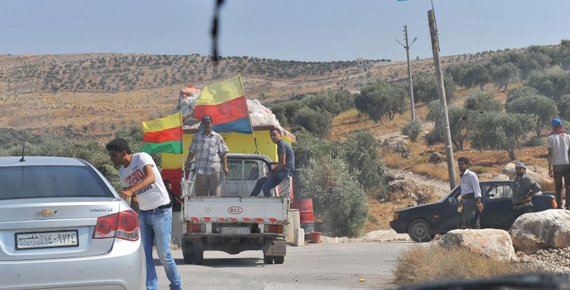The Kurdish entity born out of the invasion in Iraq and the uprisings in Syria resulted both in exaggerated expectations and fears. This state, which in fact coincided to fears and expectations about Sykes-Picot, prevented a healthy analysis and discussion of the issue. Those who took such exaggerated fears as their basis interpreted every single development in the field as another step towards "dividing and falling apart," sometimes, going too far, even to the point of "demonizing the Kurds." And those who relied on exaggerated expectations made political moves that were not only divorced from the realities of Mesopotamian geopolitics to the point of extending to dreams of neo-Sykes-Picot, but were also anachronic.
While the "Sykes-Picot order and its borders" meant division and weakening for our region, for the Kurdish political movement it represented the advantages all other actors acquired at the cost of Kurds. This approach, however, does not seem to have the necessary maturity to question what in fact all other actors have gained from "Sykes-Picot" order in the last century. In such an approach in which one's loss is seen as the other's gain, the first casualty is politics and history itself. In fact, regardless of how things were arranged within the borders drawn as a result of the First World War, all peoples of the region were among those who lost. A simple mental exercise of going through all possible conflict scenarios had the Sykes-Picot order given the Kurds a nation state could be enough to comprehend the century old maelstrom in which there are no winners. Without a doubt, there will be those who interpret the analyses above as "century old excuses" crafted for Kurds. However, the quandary we are in now leaves us with two choices -- we either seek, through rational analyses, for a "new order," in which everyone is an actual actor or we, intentionally or not, remain prisoners to the clichés of the century old status quo and let the "disaster scenarios" repeat itself.
CENTURY-OLD DRAMA OF THE MIDDLE EAST
Let's imagine some possible scenarios that could come about if the Sykes-Picot maps were to be realized today. First, let's remind ourselves that neither the Turkish nor the Arab states in Mesopotamia were built on lands in which only Turks or Arabs live. Similarly, it is physically impossible for the territory defined as Kurdistan today to be consisting of Kurdish peoples, only. This fact is the very source of the century-old drama lived in Turkey, Syria and Iraq.
Sykes-Picot borders have not only presented us nation-states, but inscribed denial, assimilation, nationalism and secularism into the package as well. It should always be kept in mind that were the territory known as Kurdistan today to become a reality exactly as imagined by Kurdish nationalism, non-Kurdish peoples would make up almost half of its population. For example, the last thing that could happen in the territory known as the Iraqi Kurdistan, independent of Syria, Iran and Turkey (even if Kirkuk and Mosul were included as imagined by Kurdish nationalism) is a state based solely on Kurdish ethnicity. It is certainly possible to overlook this reality.
It would not be difficult to imagine that the cost of such an oversight would be comparable to the cost of Kemalism in Turkey, Baathism in Iraq and Syria. It would be naïve to expect a different outcome from the break of the ethnic-sectarian fault lines that were activated as a result of invasion in Iraq. Or else, the new nation state of Iraqi Kurdistan, established on the belated premise of nationalism, will have to devise a miracle political solution to appease the non-Kurdish peoples that made up almost half of its population.
The picture given above can be read in one of two ways. All the equations in the region are evaluated based either on the assumption that the intention has always been to leave the Kurdish nation stateless; or on the belief that all peoples in the region are in dire need of a new political contract beyond Syk







